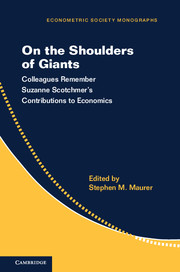Book contents
- On the Shoulders of Giants
- Econometric Society Monographs
- On the Shoulders of Giants
- Copyright page
- Dedication
- Contents
- Contributors
- Preface
- Acknowledgments
- Chapter 1 Introduction
- Part I Threads in the Tapestry
- Part II Innovation Theory (I): Cumulative Innovation
- Part III Innovation Theory (II): Law and Economics
- Chapter 19 The Long Journey: From Models to Legal Doctrine
- Chapter 20 M. Schankerman and S. Scotchmer, “Damages and Injunctions in Protecting Intellectual Property” (1999)
- Introduction Stephen M. Maurer
- Damages and Injunctions in Protecting Intellectual Property
- Documents
- Chapter 21 Pamela Samuelson and Suzanne Scotchmer, “The Law and Economics of Reverse Engineering” (2002)
- Chapter 22 S. M. Maurer and S. Scotchmer, “Profit Neutrality in Licensing: The Boundary Between Antitrust Law and Patent Law” (2006)
- Part IV Club Theory
- Part V Evolutionary Game Theory
- Part VI Public Policy
- Part VII Living Legacy
- Part VIII Epilog
- Bibliography
- Index
- References
Documents
from Chapter 20 - M. Schankerman and S. Scotchmer, “Damages and Injunctions in Protecting Intellectual Property” (1999)
Published online by Cambridge University Press: 12 October 2017
- On the Shoulders of Giants
- Econometric Society Monographs
- On the Shoulders of Giants
- Copyright page
- Dedication
- Contents
- Contributors
- Preface
- Acknowledgments
- Chapter 1 Introduction
- Part I Threads in the Tapestry
- Part II Innovation Theory (I): Cumulative Innovation
- Part III Innovation Theory (II): Law and Economics
- Chapter 19 The Long Journey: From Models to Legal Doctrine
- Chapter 20 M. Schankerman and S. Scotchmer, “Damages and Injunctions in Protecting Intellectual Property” (1999)
- Introduction Stephen M. Maurer
- Damages and Injunctions in Protecting Intellectual Property
- Documents
- Chapter 21 Pamela Samuelson and Suzanne Scotchmer, “The Law and Economics of Reverse Engineering” (2002)
- Chapter 22 S. M. Maurer and S. Scotchmer, “Profit Neutrality in Licensing: The Boundary Between Antitrust Law and Patent Law” (2006)
- Part IV Club Theory
- Part V Evolutionary Game Theory
- Part VI Public Policy
- Part VII Living Legacy
- Part VIII Epilog
- Bibliography
- Index
- References
Summary
We investigate how liability rules and property rules protect intellectual property. Infringement might not be deterred under any of the enforcement regimes available. However, counterintuitively, a credible threat of infringement can actually benefit the patentholder. We compare the two doctrines of damages, lost profit (lost royalty) and unjust enrichment, and argue that unjust enrichment protects the patentholder better than lost royalty in the case of proprietary research tools. Both can be superior to a property rule, depending on how much delay is permitted before infringement is enjoined. For other proprietary products (end-user products, cost-reducing innovations), these conclusions can be reversed.
- Type
- Chapter
- Information
- On the Shoulders of GiantsColleagues Remember Suzanne Scotchmer's Contributions to Economics, pp. 164 - 195Publisher: Cambridge University PressPrint publication year: 2017

